Template and Copyright Notice
Templates to create your camera-ready copy for the proceedings are available in Word and LaTeX, otherwise ACM might not accept the paper for the digital library.
The recommended template is ACM's single column format customized for PLoP. An example with PLoP's copyright notice can be found in this PDF, and the template is provided here:
- Single column format Word template (new version)
- Single column format TeX template (new version)
Note: Use the following ACM Classification for Categories and Terms ACM Classification
Please use the following text as the copyright notice on the first page.
Permission to make digital or hard copies of all or part of this work for personal or classroom use is granted without fee provided that copies are not made or distributed for profit or commercial advantage and that copies bear this notice and the full citation on the first page. To copy otherwise, to republish, to post on servers or to redistribute to lists, requires prior specific permission. A preliminary version of this paper was presented in a writers' workshop at the 2Xth Conference on Pattern Languages of Programs (PLoP). PLoP'XX, OCTOBER XX-YY, Allerton, Illinois, USA. Copyright 20xx is held by the author(s). HILLSIDE 978-1-XXXXXX-XX-X
Alternatively, ACM's two-column template will also be accepted. In this case, it is of particular importance that you leave sufficient space in the lower left corner of the first column on the first page, to insert the copyright information.
Authors, how was your last shepherding experience?
Here is a scale of shepherding excellence to think about.
Shepherds, where do you think your "author" would rate you?
1. Oh, I had a shepherd?
2. My shepherd made contact, and promised to send comments.
3. My shepherd actually sent a set of comments.
4. My shepherd was positive and supportive.
5. My shepherd was prompt.
6. The comments from my shepherd had substance; not just grammar and wording.
7. My shepherd gave me two or more sets of comments.
8. I learned more about patterns from my shepherd.
9. I learned more about my own topic.
10. My shepherd helped me learn more about myself.
Shepherds, how well did your "author" do?
Authors, where do you think your shepherd would rate you?
1. Never heard from the author.
2. The author apologized for not responding.
3. Got one revision -- just before the shepherding deadline.
4. Ignored all my suggestions.
5. Was clueless.
6. Really did try to improve the patterns.
7. Sent two or three revisions.
8. I learned more about patterns from the shepherding experience.
This document represents some guidelines for accepting papers for the PLoP conferences. Any feedback is welcome.
Multiple Paper Submissions
-
Quick pass read by members of PC to eliminate papers that are in the
wrong conference or don't pass muster. -
Guarantee that at least one author will attend conference -- before
shepherding -- but how can we back this up? -
One author - one paper -- is this too harsh?
-
Only the author can represent the paper at a workshop, if author can't
attend, paper is dropped from workshop
The Pattern community is unique in the individual mentoring we give to each other through shepherding. Many of us have learned a great deal from our shepherds. Many of us enjoy serving as shepherds because it is so rewarding to help others improve their patterns.
Shepherding requires commitment and follow-through by both the shepherd and the author. When you as an author submit a work to a PLoP conference, you implicitly promise to do certain things. Likewise, when you agree to shepherd a paper, you make promises as well. Here is what we expect from both:
The Author:
-
Respond to the Shepherd. The shepherd will be giving you help, free of charge. When you get comments, turn around a new draft of your patterns quickly. You don't have to get it perfect; it is better to be timely than complete.
-
Give two or three Updates. We know you are busy, but just one updated paper right at the end of the shepherding session just doesn't cut it.
-
Attend the Conference. When you submit a paper, you imply that you will attend the conference if your paper is accepted. While we recognize that things do come up, it is your responsibility to arrange funding, visas, etc., in plenty of time for the conference. At this time, no PLoP is asking for a deposit at the beginning of shepherding, but it could happen if people continue to abuse it.
-
Thank the Shepherd. Ok, this is kind of a no-brainer, but it bears repeating. The shepherd is donating time and expertise. The least you can do is thank your shepherd.
The Shepherd:
-
Contact your Author Promptly. Do it right away; the same day you get the paper assigned. It really takes no time at all, and it gets shepherding started on the right foot.
-
Give two or three Iterations of Comments. So plan your time accordingly. You don't have to get everything right; it's better to be prompt than complete.
-
Focus on Substance. This is shepherding, not proofreading.
-
Keep the Program Committee in the Loop. Don't forget to copy your mails to your PC member.
-
Have High Standards. It's ok to demand excellence of the author. At the conclusion of shepherding, you will be asked your assessment of the paper. Don't recommend acceptance just because the author is a nice person, or they really tried. If a paper is accepted, it will be workshopped by as many as ten people. Don't cause them to waste their time on junk.
Shepherds and Author:
Rate your Shepherding Experience!
Writers' workshops are used by the pattern community to improve our patterns and other manuscripts. These workshops are the primary focus of our time at PLoP and in them we discuss accepted papers. Authors are assigned to a writers' workshop and are expected to attend all sessions in that workshop. All other conference attendees are encouraged to attend one or more writers' workshop sessions, preferably choosing to read and review papers where they can contribute. Paper assignments to workshops are posted before the conference.
The format of writers' workshops has been adapted from the creative writing community. Each writers' workshop contains a handful of papers, which authors must read before the conference to be able to give each other feedback on their work in a peer review session of around one hour per paper. Richard Gabriel has written both a book and a pattern language on writers workshops. The pattern language is a good place to start.
Each writers' workshop is led by a moderator. In each session, the author or authors of the paper under discussion remain (mostly) silent while the others discuss it and explain insights and views they have about it. Depending on the workshop moderation style, authors may be brought into the discussion to gain insight and clarity about their work. From these sessions, authors get much feedback and many suggestions about how they can improve their work.
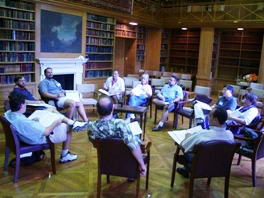
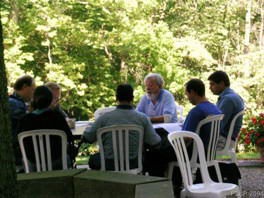
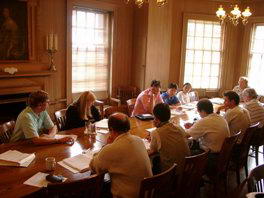
A fruitful participation in a writers' workshop session requires each participant to read the papers in advance and to take some notes on what was liked about the papers and what needs improvement. Because there's no reading time during the writers' workshops—experience shows that chatting with others or me\ eting people is much more fun than being alone reading papers—do yourself a favor and read the papers of your writers' workshop in advance.
Structure of a Writer's Workshop
The writers workshop format is a particularly effective method to review, evaluate, and improve pattern descriptions. The general structure of a writers workshop has a group of ``discussants'' read the paper carefully before the session. During the workshop, the discussants examine the strengths and weaknesses of each paper, accentuating positive aspects and suggesting improvements in content and style.
Although the author is present, he or she remains ``invisible'' during most of the discussion. The author is expected to take notes and/or have someone take notes for them during the discussion (so they can concentrate on the discussion). Many reviewers also give their marked-up copies of the paper to the authors with further written comments. These comments are intended to help the author improve the paper, but the author is not obliged to follow all the suggestions. The entire process normally takes about an hour per paper.
Within a writers workshop session, papers are discussed in several ``rounds'' according to the following format:
- The paper is discussed by a group of people including its author, a moderator, and a group of reviewers who are familiar with the contents of the paper.
- The author of a paper reads a paragraph of his/her choice. The goal is to let the author express what he or she feels is particularly important about the pattern, as well as to give participants a chance to get to know the author a bit.
- One or two reviewers briefly summarize the paper from their personal viewpoint. The goal is to identify what the reviewer(s) thought were the key points of the pattern. Since the other participants should already have read the work, the summaries should be concise. In particular, it's best to avoid debating any inconsistencies between different reviewer's interpretations of the paper at this point.
- The group then discusses what they liked about the paper, first in terms of content and then in terms of style. The goal is to identify and praise the strengths of the work.
- After presenting the positive aspects of the paper, the group discusses how to improve the content and style of the paper. The goal here is not to criticise the paper per se, but rather to give the author constructive suggestions on how to make the paper better. In general, the style for critical comments is to first state the problem followed by a suggestion on how to solve the problem.
- After this discussion, the author of the paper may ask questions of the reviewers to clarify their statements. The goal is to give the author a chance to better understand certain comments, rather than to defend the paper.
- The session closes with the audience thanking the author for writing the paper.
Note that during rounds 3, 4, and 5 the author of the paper is only ``virtually'' present. He or she does not actively participate in the discussion. Moreover, the reviewers do not address him or her directly, i.e., the reviewers discuss the paper as if its author is not present. In particular, the reviewers should refer to ``the author'' in the third person and should not look at the author when making comments. Another outline can be found here.
Note Allan Kelly has created a PDF flowchart which can be found here.
Suggestions for a Successful Writer's Workshop
The following are some suggestions for holding a successful writer's workshop. The purpose of these suggestions is to foster creativity and sharing of ideas and insights among the participants and to respect and appreciate the contribution of the authors.
- Ensuring appropriate atmosphere -- It is very important that workshop participants act professionally and courteously towards each other and towards the author during a workshop. The goal is to ensure that participants feel comfortable sharing their insights and suggestions for improvement. We all feel uneasy when we are being evaluated, and so authors will feel nervous under the best of circumstances. If one of the workshop attendees is very critical then the author will feel so bad he or she will probably never want to come back.
It is the responsibility of the moderators (and particularly the lead moderator) to ensure the atmosphere of the workshop is constructive and conducive to insightful discussions, rather than having people show off their intellect by attacking other people. Moreover, it's very important to stress positive aspects of the paper before presenting (constructive) criticisms.
- Contributions by non-authors -- Moderators should ask each author whether they would like to include or exclude non-authors from commenting on their paper during their workshop review. In addition, moderators should let authors comment on the paper being reviewed before asking for non-author comments. The goal is to make sure that those who have contributed their effort to write papers for the workshop are recognized accordingly.
We've found that non-authors usually have good things to contribute, and authors would lose a lot if they didn't get their input. However, we realize that most of the authors do not have a lot of writing experience. They are expert developers, not expert writers, so we are sympathetic and try to be as helpful as we can be. The authors are sharing their hard-earned experience with us, and we want to demonstrate our appreciation to them.
- Circle organization -- When possible, the writer's workshops should be organized with the authors in the workshop sitting in the inner circle, and non-authors sitting in the outer circle. The goal is to recognize the authors, who have contributed their efforts to making the workshop possible, and to encourage the authors to contribute to the discussion. Naturally, if the room isn't large enough to accommodate this, then everyone should sit in a single larger circle.
- Rotating moderators -- It has been common practice at past PLoPs to rotate moderators among authors in writer's workshops. The goal is to give authors the opportunity to gain experience moderating a writer's workshop. It is the responsibility of the lead moderator for each session to help other moderators if questions arise.
- Workshop size -- To avoid overcrowding, please limit the number of non-authors in a writer's workshop to around 10. The goal is to disperse the non-authors relatively evenly throughout the 7 workshops. Since we have almost 80 authors at PLoP '96 (and about 110 attendees) this should be fairly easy to do since the average number of non-authors will be about 5 per session.
portions of this page were originally posted on www.c2.com
PLoP

Pattern Languages of Programs (PLoP™) conference is a premier event for pattern authors and pattern enthusiasts to gather, discuss and learn more about patterns and software development... Learn More
Euro PLoP
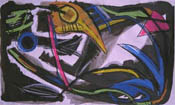
EuroPLoP™ is a conference that explores, develops and celebrates patterns in software. As with PLoP™ in the US, the main focus of EuroPLoP™ will be a series of writer's workshops where pattern authors work together to improve their patterns... Learn More
GuruPLoP
![]()
GuruPLoPTM is hosted in India and is open to pattern authors, pattern users, and software designers and developers from around the world... Learn More
ChiliPLoP
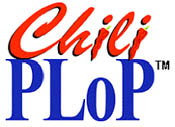
The 13th Annual ChiliPLoP features "hot topics" for experienced folks... Learn More
Asian PLoP
![]()
AsianPLoPTM is hosted in Tokyo, Japan and is open to pattern authors, pattern users, and software designers and developers from around the world... Learn More
SugarLoaf PLoP

SugarLoafPLoP brings together researchers and practitioners whose interests span a remarkably broad range of topics, who share an interest in exploring the power of the pattern form... Learn More
Viking PLoP

VikingPLoP is a conference in the tradition of the PLoP conferences, held in different places in Scandinavia; that's what the Vikings did -- they were always moving to new territory... Learn More






